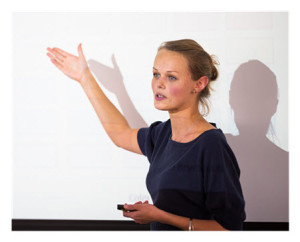Are you dating an introvert… or living with one? Great! Especially if you’re an introvert, too.
 Care for an example from my own online adventures? Try this: I come across a profile where the man in question is funny, smart, smiling, tall… These characteristics catch my attention, but when you add his mention of ‘introvert’ to the mix… Be still, my heart!
Care for an example from my own online adventures? Try this: I come across a profile where the man in question is funny, smart, smiling, tall… These characteristics catch my attention, but when you add his mention of ‘introvert’ to the mix… Be still, my heart!
He will be at ease with companionable quiet, at ease with introspection, and likely be at ease with someone like me.
And so it is that I find myself happily chatting over coffee with a gregarious man who winds down a tale of intrigue, I soak up a comforting pause, and then launch into a story of my own, which he takes in with interest.
And my relief is palpable. Regardless of what our conversation may yield, I can count on the fact that many of my behaviors will require no explanation.
Thank You, Susan Cain
Much has been written about introverts since Susan Cain’s book, Quiet: The Power of Introverts in a World That Can’t Stop Talking. What has followed are articles, websites, TED talks and more, including a willingness to label oneself as introverted.
Suddenly, the seemingly less ‘socially adept’ members of society are coming out of the closet. And we find ourselves less wounded by the slew of advice and how-to’s encouraging us to get out of our shell or ‘just try harder.’
It’s like a presidential pardon for those of us who may have dated or married individuals who don’t crave bouts of silence as we do, who don’t prefer small gatherings as we do, or for that matter, who don’t bask in observation and introspection, which can also be part of the introvert’s M.O.
And as we who wave our Introvert Flag come to understand more about ourselves, self-knowledge (and self-acceptance) may inform future choices of friends and partners.
So I say — all hail the introverted date, lover, spouse or friend!
But wait… It isn’t quite so simple.
Introversion Is More Than the Opposite of Extroversion
Once, we saw people as introverts (bad) or extroverts (good). As I just mentioned, generally thought to be characterized by preferring to socialize in small groups, being introspective, or even something of a wallflower, these depictions are painted with such broad brushstrokes that something seems off.
This is especially true when we’re in the company of someone whose day job includes presenting to and interacting with large groups, and indulging a penchant for lively discussion. I can look back at my corporate career and see how much I loved training a roomful of customers or playing to the crowd in front of a large gathering of hot prospects.
I thought these were signs of extroversion, but I couldn’t reconcile my intermittent performance pleasure with the deep need to be off by myself, to have chunks of alone time with my thoughts, and time to recharge.
Stumbling into this 2015 article on four kinds of introversion gave me an “aha” moment, as the writer reports on social, thinking, anxious, and restrained introversion categories. The definitions provided offer a deeper dive into the variable traits that characterize the introvert.
 Incidentally, the article links to a quiz you can take to see where you fit on these four dimensions.
Incidentally, the article links to a quiz you can take to see where you fit on these four dimensions.
Alone in a Crowd?
Drop me all alone in the middle of nowhere?
I’ll run screaming for the nearest sign of an urban center!
Drop me in a bucolic setting where I may smile at a stranger passing by, strolling with her child?
No running, no screaming… I’m people-watching!
And if you drop me in almost any locale with someone wonderful, fascinating, brilliant, kind-hearted — and preferably an introvert — I may still want to sit in a café and observe the world going by, but I’m more likely to enjoy the environment as well as the person I’m with.
Is it typical introvert behavior to like being “alone in a crowd?” I don’t know. But if I can sit and observe, it is both comforting and comfortable. Being “on” in a crowd when I feel unprepared… well, it’s not my cup of tea, though like most of us, I’ve learned to manage it.
In the dating world? Or when socializing for business?
While I don’t suffer terribly from social anxiety — hello, handy icebreakers — I choose talking with one or two people over the more sizable group, even at a more crowded function.
Hey Extrovert! Make Room for Quiet, Please
 In my experience, pairings of introverts and extroverts pose challenges. Yes, yes, I know. All relationships pose challenges. Yet one of the aspects of my marriage that worked well was mutual comfort with quiet. In light of greater understanding of introversion, I recognize my ex-husband as having characteristics along each of the four dimensions described. I also recall how nice it was that he was comfortable without filling the air with talk.
In my experience, pairings of introverts and extroverts pose challenges. Yes, yes, I know. All relationships pose challenges. Yet one of the aspects of my marriage that worked well was mutual comfort with quiet. In light of greater understanding of introversion, I recognize my ex-husband as having characteristics along each of the four dimensions described. I also recall how nice it was that he was comfortable without filling the air with talk.
Were we too comfortable with what amounted to too much silence? Perhaps.
In other relationships, my pressing need for more ‘space’ was, I now realize, a sort of reaction to pairing with an extrovert. And as I dip a toe into the dating pool again, more aware of my own (introvert’s) requirements, I return to the formula that I conclude works best for me:
Introvert + Introvert = Sigh of Relief.
Do I sympathize with the extrovert whose exuberance can in fact be contagious? Do I understand how much he or she wants to go out? Of course. And this article from Elite Daily offers tips for the extrovert who is dating an introvert, pointing out numerous ways in which the former can enjoy the traits of the latter.
As for my tendency to take pleasure in self-examination, intricate analysis, and introspection, I no longer feel that I have to apologize for what is my way of ‘just being.’ In the company of someone who lives the same needs, these too are met with complete comprehension.
 No need to rationalize what feels entirely natural.
No need to rationalize what feels entirely natural.
Drawn to Someone Who Is Everything You Aren’t?
Do opposites attract? For many people, they seem to, yes. As I think of my maternal grandparents, they were certainly opposites — my grandfather, the consummate life of the party, and my grandmother, seemingly content to be his audience. Her preferred world was observing and drawing nature, gardening, and quiet conversation.
Now, it’s one thing to find ourselves wildly attracted to someone whose lifestyle seems very different from our own, but… While the bookish man may be attracted to the social butterfly, is it likely to work in the long run?
If they share scads of interests, if they share values, and if passions flame red hot, can they also respect each others’ divergent socializing inclinations?
I may be a proponent of not too much togetherness, however, the intimacy that is built by shared experience and thoughtful communication is, to me, the mortar and brick that we must lay together.
Do pop over to the introversion quiz linked in the article. How reliable it is I couldn’t say, but the questions lead to insights as to our preferences or more “natural” comfort zones, and may be illuminating when considering our next date, our spouses of many years, our friends, our children, and our co-workers. And doesn’t this help us understand each other — and, perhaps seek to establish relationships that feel like a better fit?
You May Also Enjoy
I’m a long time student of personality types, and have to say I like this four-types-of-introversion concept. Until I started studying and being tested with the Myers-Briggs model, I considered myself a quiet extrovert, as I considered the majority of my focus to be external. But the M-B type indicator, and every single person “type aware” person I’ve ever met, say “You’re an introvert”. I’ve always resented being judged by the way I act at parties or in crowds, as it says nothing about my inner life, or what the focus of my attention is, which very few people would ever be close enough to know without me telling them.
On that topic of inner life, the study of personality has shown me that what I had considered just an average level background thoughts about myself may not be typical, so I have gradually accepted the idea that I am indeed an introvert. But still, Carl Jung , the originator of the concept, defines introversion as paying attention to the inner self (in contrast to the external world), and in my case what is happening “out there” is far more important and interesting, and consumes more of my time, than who I am. Some Jungian interpreters say your type is governed by what “gives you energy”, and for me that again is the external. I don’t think I “get energy” from my inner life, it is just there. On the other hand, it is a part that I explicitly recognize and hold valuable.
Nevertheless, the MBTI looks at how I behave in the context of large groups of people and makes broad inferences from that. Part of the problem is that it doesn’t say much about the fact that my interests are not represented well in most large groups of people in my part of the country, whereas my small circles of friends are more closely aligned. And when the topic in any size group comes around to one I care about, I could talk your ear off! But I’m bored by small talk, am completely a“sports”ual, and have contrary political and social ideas to my surrounding culture so it isn’t surprising that I’m not energized in that setting.
With that in mind, the referenced STAR model seems like quite an improvement, with three other introversion scales besides the social one which forms the basis of Myers Briggs. I took it once, with results of 40% introversion on all four scales. Hmmmm…., I was expecting to see more introversion, and some variance between scales. I tried again, trying to move the results with answers I could still be comfortable with. No appreciable change.
So I’m not as comfortable with the results as I could be. On the other hand, the idea of accuracy, per se, really doesn’t apply to personality assessments. Their purpose is to allow you to be self-reflective, and if I were to study this test, I might gain some insight. But for the moment, on reflection, I’m OK……
So many good points. Among them, the last — Were we to use any of these results as insights and starting points, we might make more of them than simply tossing them around at social gatherings.